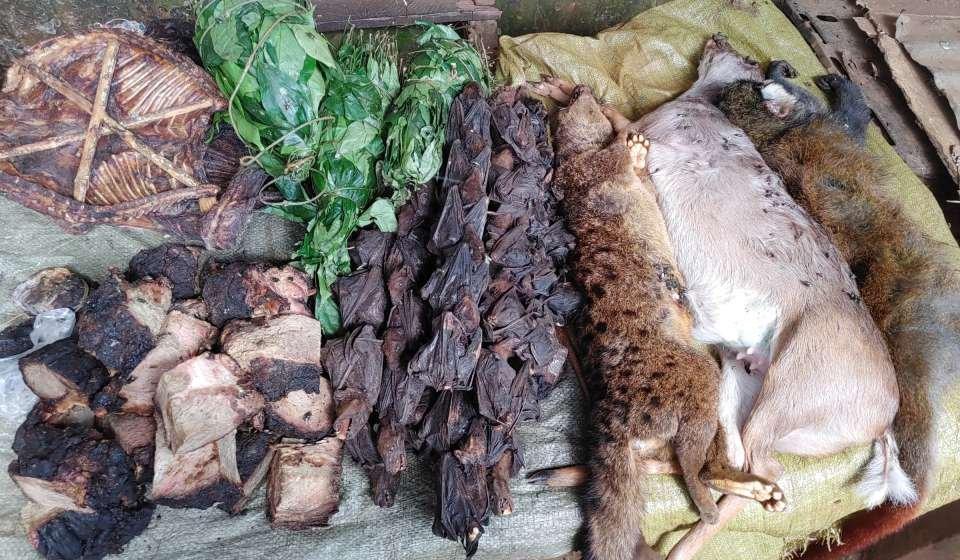
Angola: Wild Animal Trade Threatens Biodiversity and Health
From stately African elephants roaming the country’s mosaic forests to endangered black rhinos and graceful leopards, Angola is home to a remarkable variety of wildlife. The range of the giant sable antelope (Hippotragus niger variani) is even exclusively restricted to the country on the southwest African Atlantic coast – the endemic species is considered a national symbol.
“There are currently 940 species of birds, 291 species of mammals, 278 species of reptiles, 111 species of amphibians, and around 6850 species of plants known from Angola. At the same time, the pressure on biodiversity and wildlife populations in the African country is high – illegal hunting and the loss of habitats are causing a decline in biodiversity, which is likely to be exacerbated by the predicted population growth,” explains PD Dr. Raffael Ernst of the Senckenberg Natural History Collections in Dresden, and he continues, “The trade and consumption of bushmeat also pose a significant threat to Angola’s wildlife.”
Together with researchers from the University of Kimpa Vita in Angola, the Technical University of Dresden, and the University of Hamburg, the Senckenberg scientist therefore investigated the regional bushmeat trade in the Angolan province of Uíge for the first time. The study’s first author, Lunis Bolognino de Orth, visited the local central food market “Praça Grande” on 38 days, spoke to vendors, and conducted a quantitative survey among 204 citizens of Uíge.
“Our results show that bushmeat is widely consumed in the province of Uíge and is an important part of the local diet in both urban and rural areas. More than 60 percent of the population consume bushmeat at least once a week, and 23 percent regularly go hunting. During the study period, meat from a total of 1,524 wild animals of 16 different species was sold in the market in Uíge – this corresponds to a daily average of 40 animals,” explains Bolognino de Orth. Blue duikers, red-tailed monkeys, African brush-tailed porcupines, and common duikers were predominantly offered for sale. But Egyptian fruit bats, Cape buffaloes, and Central African rock pythons were also found in the market stalls. Of the 16 species noted in the central market of Uíge, six fall into a medium to high endangerment category according to the IUCN Red List criteria. “Hunting is largely seen as a tradition in Uíge, and the consumption of bushmeat is part of the local culture. However, this is in stark contrast to the growing interest in researching and protecting Angola’s biodiversity in recent years,” adds Dr. Thea Lautenschläger from the University of Hamburg, who has been coordinating the joint research activities in the northern Angolan province since 2013.
In addition to the loss of biodiversity, the consumption of meat from wild animal markets also poses a considerable risk to the people living in Angola. In particular, the consumption of primate and bat meat is directly linked to the occurrence of zoonotic diseases in Africa – especially in rural areas, which are often severely underserved medically. In 2004 and 2005, for example, the province of Uíge was the epicenter of the world’s largest and deadliest outbreak of Marburg fever, a viral infectious disease. More than 270 people were infected and over 200 deaths had to be mourned. “Stricter enforcement of environmental laws and a clear allocation of responsibilities would therefore also contribute directly to improving national healthcare,” says Ernst.
Besides the consistent enforcement of existing environmental laws, it is extremely important to create alternative livelihoods for people who make a living from the bushmeat trade or rely on hunting for food, according to the research team. The scientists are hopeful that their socio-economic analyses show a clear trend towards declining or reflected consumption among the urban population, especially among young students. To ensure that a sustainable change in thinking can take place, it is essential to make a significant investment in the education sector and raise awareness of the dangers of bushmeat consumption. “We wish and are hopeful that the upcoming generation of young Angolans will push for a fundamental change in the currently rather sluggish legal system and actively advocate for a conscientious use of natural resources and sustainable management of ecosystems and wildlife populations,” adds Ernst in conclusion.
Senckenberg – Leibniz Institution for Biodiversity and Earth System Research // Senckenberg Gesellschaft für Naturforschung
Senckenberganlage 25
60325 Frankfurt
Telefon: +49 (69) 7542-0
Telefax: +49 (69) 746238
http://www.senckenberg.de
Naturhistorische Sammlungen Dresden
Telefon: +49 (351) 795841-4315
E-Mail: raffael.ernst@senckenberg.de
Universität Hamburg
Telefon: +49 (40) 42816-516
E-Mail: Thea.lautenschlaeger@uni-hamburg.de
Leitung Pressestelle & Social Media
Telefon: 06975421434
E-Mail: judith.joerdens@senckenberg.de
![]()




